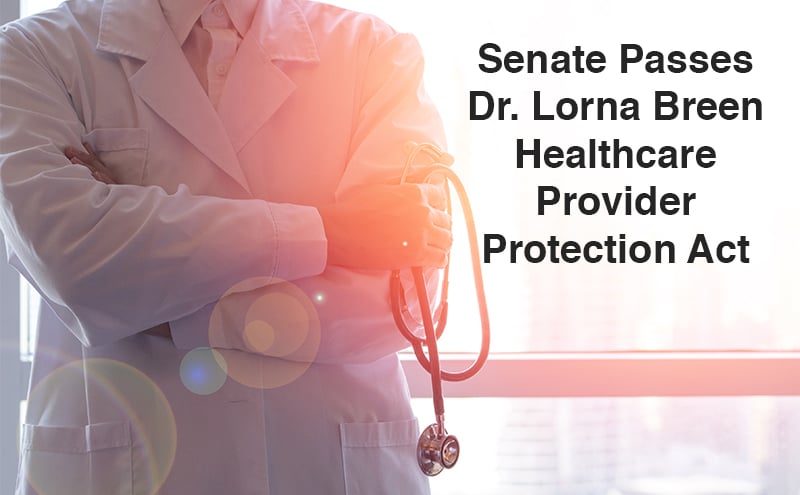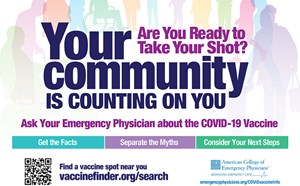Update: On March 18, President Biden signed the ACEP-supported "Dr. Lorna Breen Health Care Provider Protection Act" (H.R. 1667) into law.
From helping to inform and develop the legislative language, hundreds of meetings with legislators during LAC21 and persistent grassroots outreach by ACEP members, this legislative victory is a testament to the effective advocacy efforts and voice of emergency medicine. Just prior to its passage, the legislation had 167 bi-partisan co-sponsors in the House of Representatives and 29 in the Senate.
Above all, this legislative accomplishment for emergency medicine honors Dr. Breen’s legacy and her memory, taking a critical step forward to ensure health care workers have access to the mental health resources and services they need and deserve.
***
Update: On Feb. 17, 2022, the Senate passed the ACEP-supported "Dr. Lorna Breen Health Care Provider Protection Act" (H.R. 1667) by voice vote. It now heads to President Biden for his signature into law.
"ACEP is grateful that Congress recognizes the weight of the challenges shouldered by medical professionals on the frontlines throughout the pandemic,” said Gillian Schmitz, MD, FACEP, president of ACEP. “This important legislation honors Dr. Breen’s legacy and charts a path forward that helps limit the barriers currently preventing many emergency physicians from seeking the mental health care they need.”
Read the full press release.
***
Update: On Dec. 8, 2021, the U.S. House of Representatives approved the ACEP-supported "Dr. Lorna Breen Health Care Provider Protection Act" (H.R. 1667), sponsored by Rep. Susan Wild (D-PA), by an overwhelming, bipartisan vote of 392 to 36. The U.S. Senate passed its own version of the bill, led by Sen. Tim Kaine (D-VA), in early August, but a few minor changes were made to that text during the House legislative process, which will require the Senate to vote on the House-passed bill one final time. As soon as H.R. 1667 is formally delivered to the Senate, ACEP expects the chamber will try to get approval by unanimous consent -- clearing the way for President Biden to sign the bill into law.
***
Aug. 6, 2021
ACEP is pleased to announce that early Friday morning, the Senate approved S. 610, the "Dr. Lorna Breen Health Care Provider Protection Act." This comes on the heels of hundreds of ACEP members joining together to lobby for this legislation during last month’s Leadership & Advocacy Conference, conducting 287 meetings with legislators and staff from 44 states.
ACEP worked with Dr. Breen’s family to develop this bill with Senators Tim Kaine (D-VA), Todd Young (R-IN), Jack Reed (D-RI), and Bill Cassidy (R-LA), and it was introduced in July 2020. It was named in honor of Lorna Breen, MD, FACEP, who died by suicide in April 2020 after treating COVID-19 patients during the initial onslaught in New York City and contracting the virus herself. (Read more about how her family took up the cause of physician mental health in ACEP Now.)
S. 610 and its bipartisan House counterpart H.R. 1667 are focused on researching and developing policies preventing burnout and improving mental health among health care clinicians, along with removing barriers to accessing care and treatment (including consideration of stigma and licensing concerns).
Senate passage comes after ACEP's successful efforts to secure $140 million in funding for the bill earlier this year as part of the American Rescue Plan and the subsequent grant distribution announcement by HRSA of those funds on July 16. This funding addresses critical systemic factors to clinician mental health, including the need to remove barriers to care and the need for healthier working environments.
At the May 25, 2021 meeting of the United States Senate Committee on Health, Education, Labor and Pensions (HELP), Senator Tim Kaine thanked ACEP for its support of S. 610, the Dr. Lorna Breen Health Care Provider Protection Act.
HRSA announced the availability of $103 million through three grant programs that aim to reduce burnout and promote mental health among the health workforce.
- Promoting Resilience and Mental Health Among Health Professional Workforce - HRSA plans to provide $29 million over three years to around 10 health care organizations to support members of their workforce. According to HRSA, the funding can be used for "establishing, enhancing, or expanding evidence-informed programs or protocols to adopt, promote and implement an organizational culture of wellness that includes resilience and mental health among their employees." It is important to note that medical associations can apply for this funding. ACEP worked hard to ensure that some of the Dr. Lorna Breen funding could be provided to medical societies, since they know the unique needs of their own members and how best to support them.
- Health and Public Safety Workforce Resiliency Training Program - HRSA will provide approximately $68 million over three years to approximately 30 educational institutions and other nonprofit entities that train providers who are early in their health careers. According to HRSA, the funding can be used to help provide "evidence-informed planning, development and training in health profession activities in order to reduce burnout, suicide and promote resiliency among the workforce."
- Health and Public Safety Workforce Resiliency Technical Assistance Center - HRSA will make one award totaling $6 million over three years to "provide tailored training and technical assistance to HRSA's workforce resiliency programs."
Next Steps
ACEP now turns its focus to pushing for the House version of this bill, H.R. 1667. This is where it gets tricky – the exact same bill needs to be approved by both the House and the Senate. Because the Senate bill underwent some changes before its passage, ACEP will be pushing the House to consider the Senate version. This requires the House Energy and Commerce Subcommittee to mark up the bill before moving it to the House floor. If we can get the identical bill approved by the House, the legislation will go to President Biden for his signature.
Though the work continues to get this bill to the president’s desk, this is an important milestone worth marking. You rallied around this bill from its inception, lending your voices to the cause through letter campaigns and meetings. You have shared your personal experiences with legislators and explained why it is so important that the mental health of emergency physicians and other health care clinicians is prioritized. It is through these collective efforts that we have achieved Senate passage, and we will continue to work together to get this bill to the finish line.





